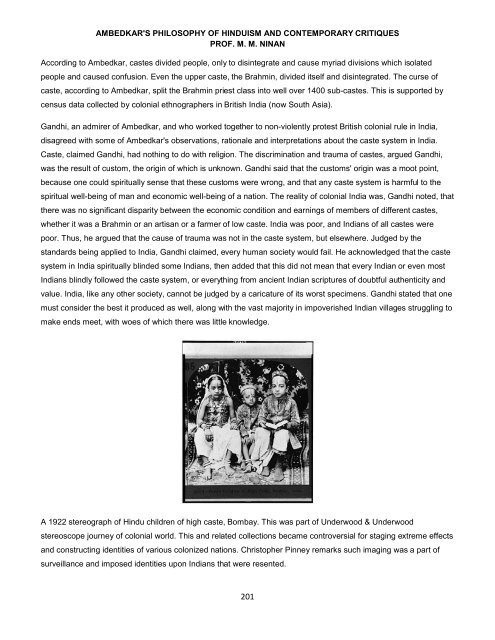Ambedkar-Philosophy of Hinduism
Create successful ePaper yourself
Turn your PDF publications into a flip-book with our unique Google optimized e-Paper software.
AMBEDKAR'S PHILOSOPHY OF HINDUISM AND CONTEMPORARY CRITIQUES<br />
PROF. M. M. NINAN<br />
According to <strong>Ambedkar</strong>, castes divided people, only to disintegrate and cause myriad divisions which isolated<br />
people and caused confusion. Even the upper caste, the Brahmin, divided itself and disintegrated. The curse <strong>of</strong><br />
caste, according to <strong>Ambedkar</strong>, split the Brahmin priest class into well over 1400 sub-castes. This is supported by<br />
census data collected by colonial ethnographers in British India (now South Asia).<br />
Gandhi, an admirer <strong>of</strong> <strong>Ambedkar</strong>, and who worked together to non-violently protest British colonial rule in India,<br />
disagreed with some <strong>of</strong> <strong>Ambedkar</strong>'s observations, rationale and interpretations about the caste system in India.<br />
Caste, claimed Gandhi, had nothing to do with religion. The discrimination and trauma <strong>of</strong> castes, argued Gandhi,<br />
was the result <strong>of</strong> custom, the origin <strong>of</strong> which is unknown. Gandhi said that the customs' origin was a moot point,<br />
because one could spiritually sense that these customs were wrong, and that any caste system is harmful to the<br />
spiritual well-being <strong>of</strong> man and economic well-being <strong>of</strong> a nation. The reality <strong>of</strong> colonial India was, Gandhi noted, that<br />
there was no significant disparity between the economic condition and earnings <strong>of</strong> members <strong>of</strong> different castes,<br />
whether it was a Brahmin or an artisan or a farmer <strong>of</strong> low caste. India was poor, and Indians <strong>of</strong> all castes were<br />
poor. Thus, he argued that the cause <strong>of</strong> trauma was not in the caste system, but elsewhere. Judged by the<br />
standards being applied to India, Gandhi claimed, every human society would fail. He acknowledged that the caste<br />
system in India spiritually blinded some Indians, then added that this did not mean that every Indian or even most<br />
Indians blindly followed the caste system, or everything from ancient Indian scriptures <strong>of</strong> doubtful authenticity and<br />
value. India, like any other society, cannot be judged by a caricature <strong>of</strong> its worst specimens. Gandhi stated that one<br />
must consider the best it produced as well, along with the vast majority in impoverished Indian villages struggling to<br />
make ends meet, with woes <strong>of</strong> which there was little knowledge.<br />
A 1922 stereograph <strong>of</strong> Hindu children <strong>of</strong> high caste, Bombay. This was part <strong>of</strong> Underwood & Underwood<br />
stereoscope journey <strong>of</strong> colonial world. This and related collections became controversial for staging extreme effects<br />
and constructing identities <strong>of</strong> various colonized nations. Christopher Pinney remarks such imaging was a part <strong>of</strong><br />
surveillance and imposed identities upon Indians that were resented.<br />
201


















